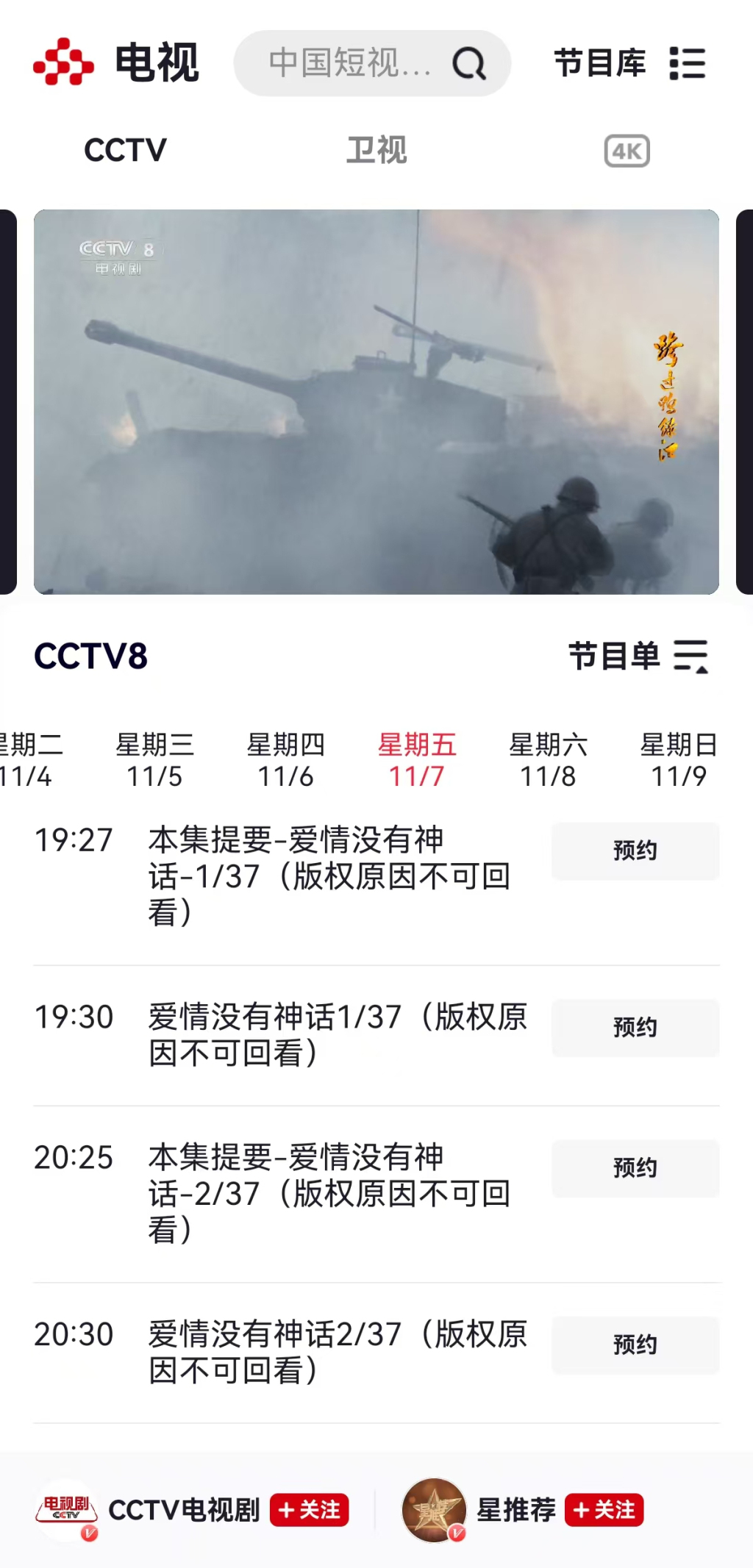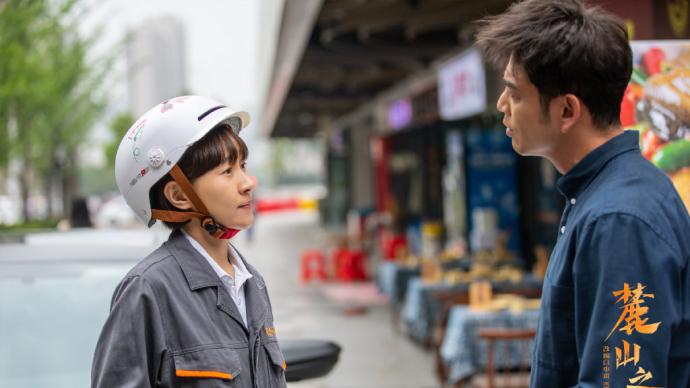
Recently, the TV series "Song of Lushan" was launched. This TV series is a rare film and television drama focusing on the reform of state-owned enterprises and the development of heavy industry in recent years. The play currently has a score of 7.8 on Douban. As a relatively unpopular theme work, this score is quite eye-catching. The director of the play, Mao Weining, said bluntly, "I want to show today's factories and workers to the audience. I hope to use this work to re-awaken the audience's attention to industry, factories, and workers."
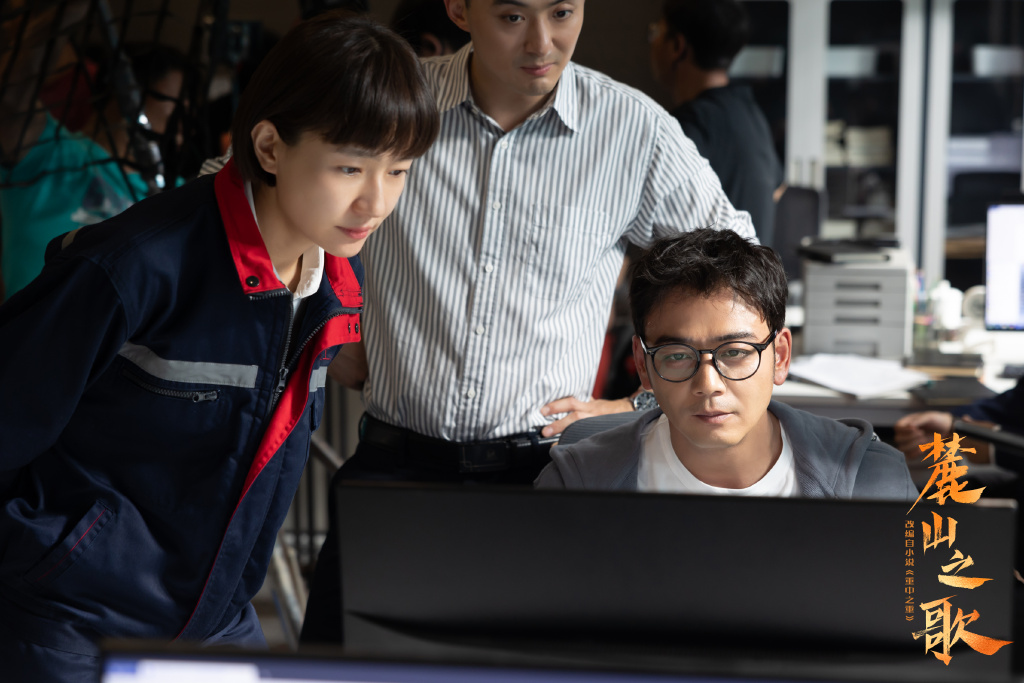
"Song of Lushan" stills
"To be honest, in my life, I am very unfamiliar with the industry." Mao Weining said, "but I am very familiar with industrial TV dramas." In his memory, in the 1980s and 1990s, when Chinese TV dramas started, Industrial themes are very popular creative themes.
"In the 1980s and 1990s, we shot a large number of industrial TV dramas, such as "Director Joe's Appointment", "Red Orange Yellow Green Blue Blue Purple", "Workshop Director", etc. These works affected many audiences at that time. , but in the past ten or two years, this subject has disappeared from the small screen, so I think we need to do such a play."
"Representing the Factory of Today"
In the second half of 2021, Mao Weining and his team began to collect materials and create scripts, and conducted in-depth research from many companies such as Sany Heavy Industry, Zhongnan Heavy Industry, Shanhe Intelligent, and China Railway Construction. After the creation of screenwriter Wang Chenggang, the story of "Lushan Heavy Industry" in the play was formed.
At first, like many ordinary viewers, Mao Weining's impression of the factory was still decades ago, "Because of the filming of this movie, I only re-entered the factory and realized that today's factory is completely different from what we have seen in the past. The same." In the past, workers made machines, but now, machines make machines. "For example, in the second half of our series, the audience will see companies like Lushan, which can no longer be seen in its smart workshop. There are workers, all machines are in automated production, and the production is 24 hours a day. The ratio of workers to engineers in enterprises has been inverted, and there are more engineers than workers.”
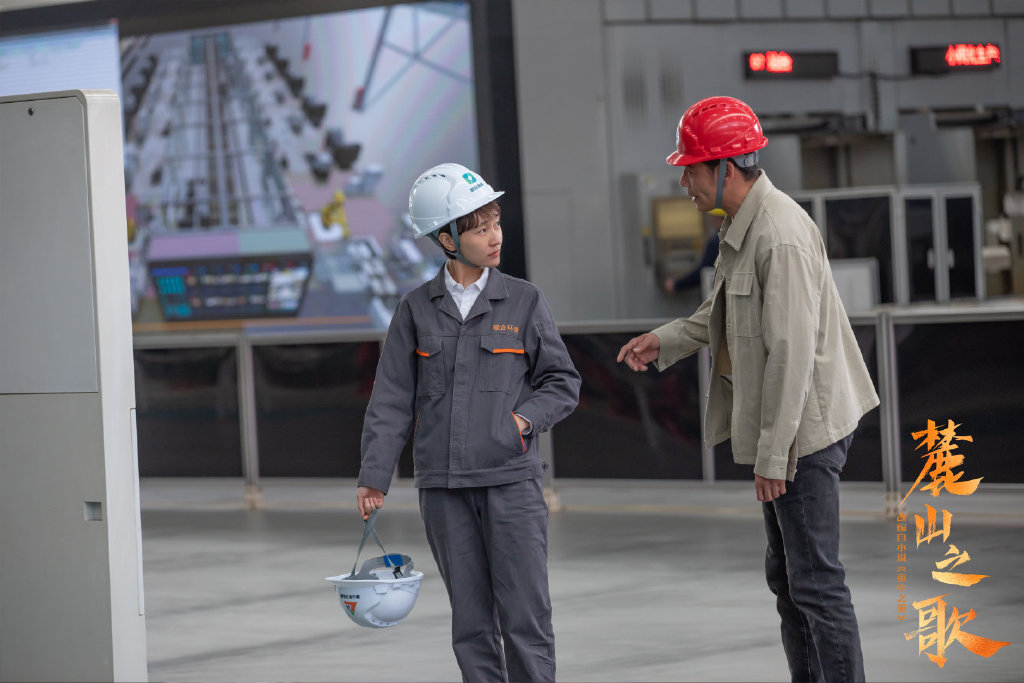
"Song of Lushan" stills
Because of this new reality scene, Mao Weining decided to use the machine as a very important visual expression point of "Song of Lushan". When the show started, there were no actors' scenes for the first three days. Mao Weining took the crew to film in the factory. machine for three days. "I want to make the crew understand that in this scene, machines are not the background, but the characters, and they are just as important as people. So we must build a love for machines and put them in an important position, you Only then can we perform them well." Mao Weining insisted, "It is also an exploration for us to photograph the feeling of man and machine staring at each other."
Including the transition in the play, this creative idea is also continued. Mao Weining asked to use aerial photography to shoot large-scale machines, so that many large-scale machines were photographed like giant forests in human vision; there are also microscopic lenses pulled from the machine's rotating aperture. Sophisticated technology is coming. "I want to visually present the industry and factories of today to the audience, and make the audience think about the relationship between people and machines."
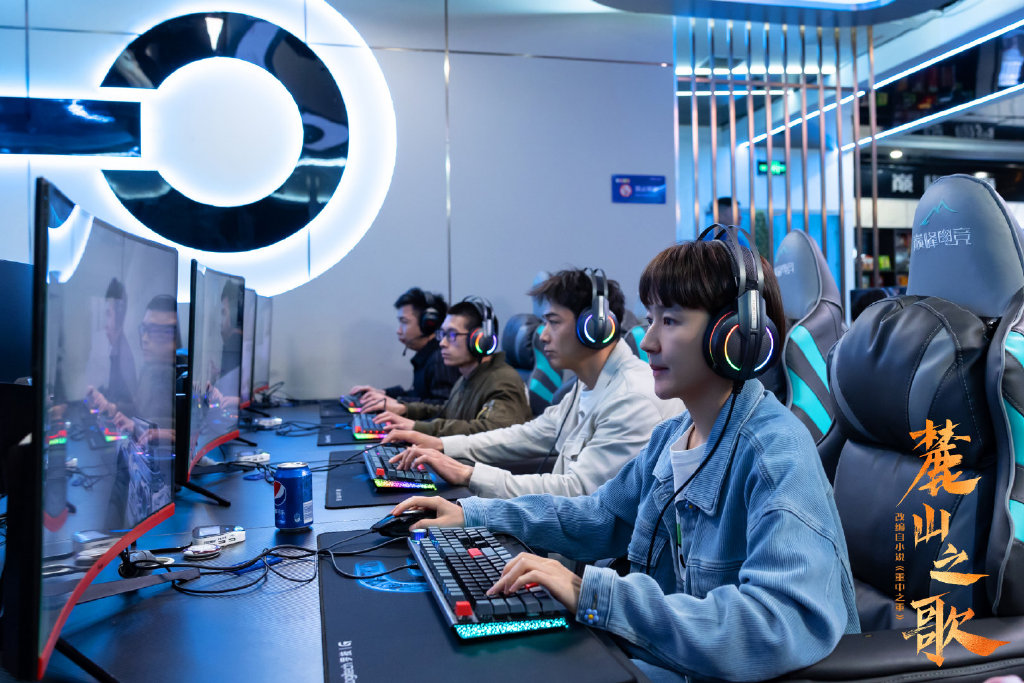
"Song of Lushan" stills
Realism themes cannot avoid reality
In addition to the new challenges in audio-visual language design, Mao Weining also bluntly stated that the threshold for creation of industrial themes is very high, and there is a cost of understanding for various industrial scenarios and professional terms, "but you can't set a high entry threshold for the audience."
Ultimately, the team chose to tell the story from 2016. Mao Weining introduced: "2016 was the lowest point for our manufacturing and heavy industry. We started from the road of 'heavy industry for finance' and presented the story at multiple levels." Around 2016, a large number of domestic heavy industry enterprises were faced with the The development choice of "whether to move from the real to the virtual", "from the real to the virtual, can quickly get rid of the current economic predicament, but from a long-term perspective, those heavy industry enterprises that adhere to the real economy have now achieved vigorous development. All Enterprises that have turned from real to virtual are still in trouble.”
"For industrial themes, from the characterization and event selection, we have adopted a creative approach that faces reality." Mao Weining said that in the first episode of "Song of Lushan", crisis and contradictions are imminent. The once brilliant Lushan Heavy Industry is now facing the crisis of a broken capital chain and a large number of layoffs. Chairman Fang Ruizhou decided to adopt the strategy of "replacing heavy industry for finance", abandoning the accumulation of heavy industry enterprises for decades, and turning to finance to solve the immediate crisis. In the face of this decision involving the future and destiny of tens of thousands of enterprises, from provincial leaders to the helm of the enterprise, to engineers who focus on scientific research, and the most common blue-collar workers, they are all facing the pain of the crisis. By maximizing the conflict of interest between various groups, the dramatic contradiction is established, and the relationship between the characters is laid out from then on. The first episode, the fate of characters and businesses, captured the hearts of the audience.
Mao Weining bluntly stated that the creation of realistic themes cannot avoid reality, let alone whitewash it. "We can't avoid reality, we have to break through, we have to explore, and in the real performance, we have to face the core of the problem deeply, so we must write straight to the point." Mao Weining bluntly said that some seemingly dramatic plots in the play actually come from real life . For example, in the play, the real case of my country's heavy industry companies providing rescue equipment for the Fukushima nuclear accident and the Chilean mine disaster was used. In the play, Fang Ruizhou, the chairman of Lushan Heavy Industry, stopped the governor's car in the heavy rain. This section, which was questioned by some audiences, was also a real experience from a corporate leader.
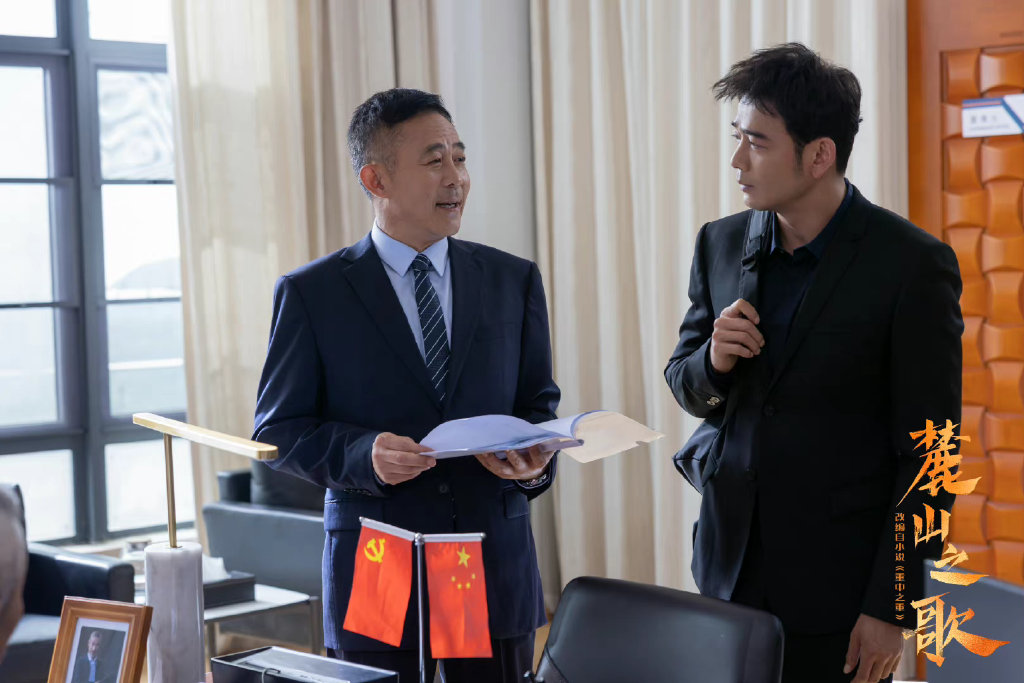
"Song of Lushan" stills
The character Fang Ruizhou in the play, in the early stage of the story, firmly adhered to the line of "heavy industry for finance", Mao Weining said, "In the beginning, we didn't want this character to run through to the end, we wanted to use new characters to solve the obstacles and problems in the early stage of the plot. , this is a result that is very convenient and easily accepted by the audience." Later, Mao Weining heard different opinions: it is better to write about an entrepreneur with complex diversity instead of such a simple treatment. "He has made mistakes in judgment, but in the end he is the one to break the predicament. Indeed, we have also contacted a large number of entrepreneurs, who have different judgments and ideas in different periods, and it is difficult to judge them with simple right and wrong. "Creatively, such a character is difficult, but he is more authentic."
"The plight of the times should not be blamed on just one individual, and the solution of the plight should not be simply attributed to one individual's efforts to turn the tide.
In the past, our industrial topics often wrote about how an entrepreneur saved the enterprise through his personal ability and charm. That is a relatively simplistic treatment. "
"Love is not the 'engine' of this play"
"When machines start to produce machines, will people abdicate from production?" This heavy question is also what "Song of Lushan" intends to explore in the second half of the plot. In the play, through the mouths of the characters, "white-collar workers escape from Beishangguang, blue-collar workers can only escape from factories", "time freedom, money, respect, workers do not have" and other "heart-breaking" lines. Mao Weining hopes that this drama can truly reflect the current situation faced by some workers. "They do encounter such problems, and they also want to change the status quo, so why these status quos are caused is also our concern." The future of workers is optimistic, "Sometimes it is the general trend to replace people with machines, because machines can indeed replace a lot of human labor, but in the final analysis, the machines that replace people are also made by people, so this kind of 'replacement' is essentially a technology Upgrading, then it is also the upgrading of workers.”
At the end of "Song of the Foothills", the main creative team designed the actors to interact with real workers and craftsmen in the work and study scenes of the workers, and the "master" full of respect is very touching. "'Master' is the first name for workers in the industrial system. We must have factories, a real economy, and industries. These things need to be upheld. Now we will feel that the virtual economy occupies the main part of our lives. Part of it, but know that even in today's booming virtual economy, the basic needs of our lives come from industry."
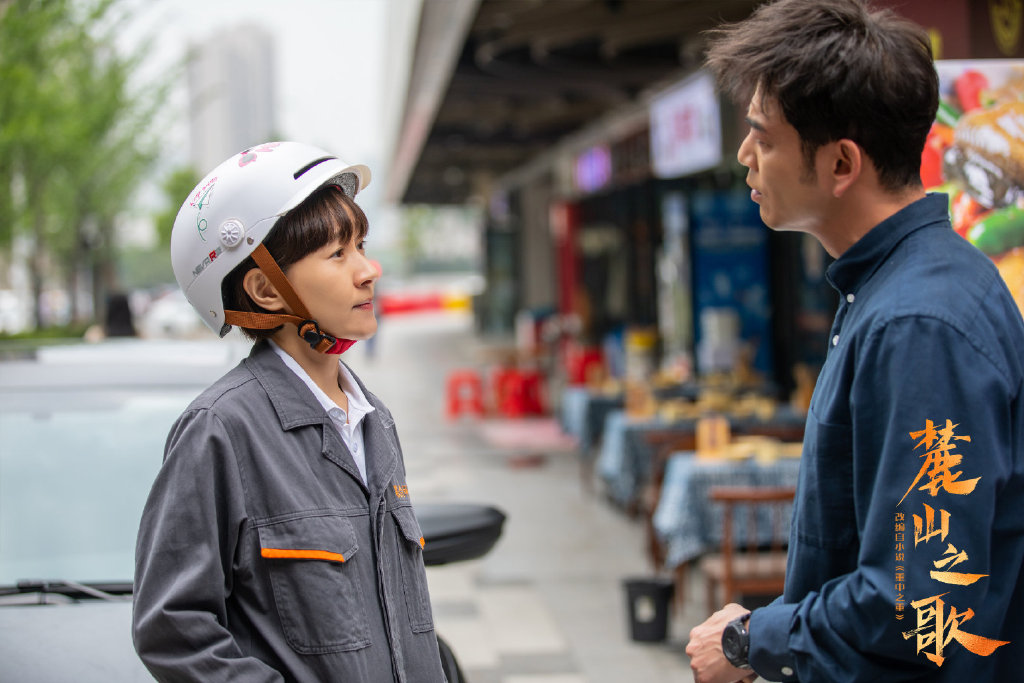
"Song of Lushan" stills
The male and female protagonists in the play, one is a scientific researcher with a double doctorate degree, and the other is a blue-collar worker with a grassroots background. Combining these two people is also a metaphor for the fusion between the two occupations: the knowledge and upgrading of workers. , a collision with researchers on the front line. "Wei Cheng is the cloud in the sky, and Jin Yanzi is the grass on the ground. The two people are not next to each other at all. The relationship between these characters is dramatic and representative, and a story can naturally form between the two people, but our difficulty is to be realistic and reasonable. It should be logical and reasonable, and let the audience believe that the two of them can finally come together, the grass on the ground will grow upward, and the clouds in the sky will rain. "Mao Weining said, " It's impossible not to write about love in a play, but I have a consensus with the screenwriter that we can't make this play a love drama in an industrial guise, and love must not be the engine of this play, but the character's predicament."
Yang Shuo plays an eccentric genius scientist, and Jiao Junyan plays a front-line worker. The choice of actors is quite innovative, and Mao Weining is also the first time to cooperate with two actors. He said that his casting criteria are the first to love the role, and the second to be able to play it well and whether it is suitable or not. "I don't care what level of actor you are, if you don't love the role, no matter how big you are and how good you are, how can you play well?"
Mao Weining said that Jiao Junyan knew the right person at the first contact. "First, she loves the role very much, and her mother is a worker. Growing up in the factory, she has a deep affection for the factory." For this role, Jiao Junyan learned Welding learns to drive excavators, and in all the work scenes in "Song of Lushan", she goes on the field to operate it by herself.
Regarding Yang Shuo, Mao Weining said bluntly, "Maybe everyone has some stereotypes about him, even I have them. I didn't think he was a suitable candidate at first." With perseverance, he repeatedly expressed his hope to have a chat with Mao Weining, even if he did not act. Later, as soon as the two met, Yang Shuo memorized the pi to Mao Weining. "At that time, he could memorize it to 100 decimal places. Later, when the shooting started, he could memorize it to two or three hundred digits, and he would memorize the periodic table of elements for me." Mao Weining recalled, "His perseverance touched me. Wei Cheng had such perseverance, and I realized that I had to give up my prejudice. In fact, in life, he was very shy and introverted. The character is well-acted, but the audience confuses his performance with a human being."
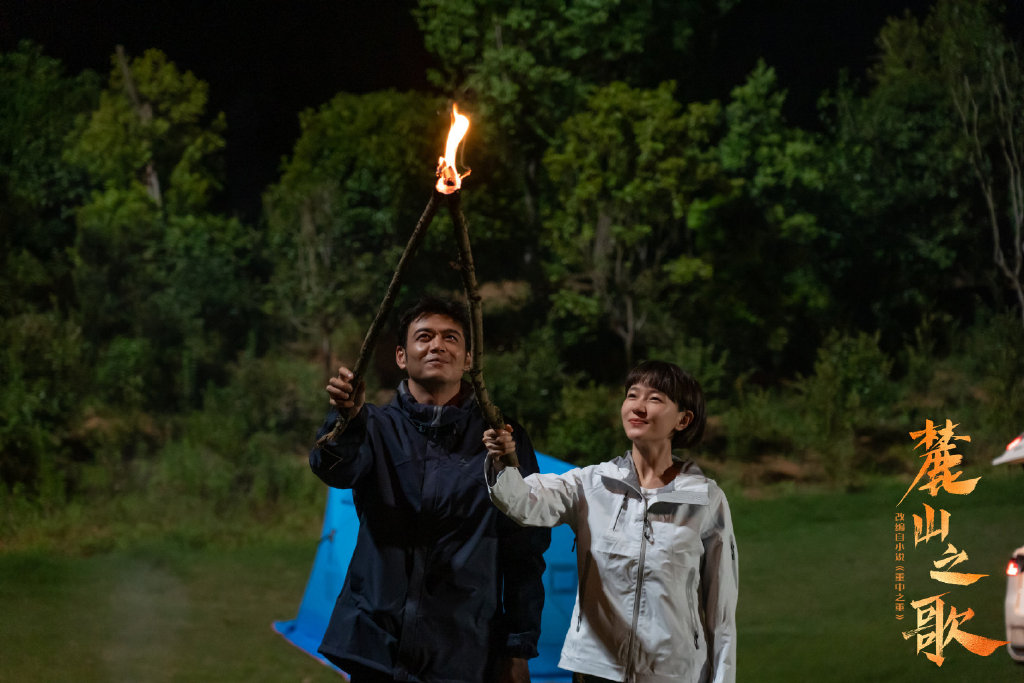
"Song of Lushan" stills
Big themes, small cuts
From "Meritorious Deeds" to "Song of Lushan", Mao Weining can always make the "proposition composition" real and moving, making the audience empathize with emotion. "Any drama must have a theme expression, and the expression of that theme falls into the drama, it is actually a question of authenticity." Mao Weining said bluntly, "No matter what theme, you must have real characters, real emotions and real stories. , the audience is attracted by the characters, moved by the emotions, and shocked by the story, and they will like your play. The audience doesn't really care what the subject matter is. For the audience, looking good is the first priority. The creator should not put the theme first, and the creation must be implemented. , must be closely related to the audience, the grand theme, its incision must be small. Be sure to find people and stories that the audience can empathize with, and tell it well.”
"I always think that what to shoot is important, but how to shoot is more important." Putting grand propositions into detailed reality tests the creator's insight into life and the specific ability to reproduce this life in drama. "The characters and stories you create must have both authenticity and drama. Making the impossible possible is dramatic, but how to make the impossible possible, this process requires authenticity." Taking into account both authenticity and drama, in addition to observing life, the creator must refine and express life.
In "Meritorious Service", in order to present Li Yannian's two-day and one-night battle for the highlands, Mao Weining and his team spent 30 days and 28 nights re-enacting the battle. In order to present the war effect more realistically, 200 soundtracks are made in each episode. "The different sounds of different weapons must be posted one by one."
When it came to "Song of Lushan", under the epidemic situation, the studio could have finished filming, but Mao Weining still insisted on "going back to life", going to the airport, going to the airport, going to the street, and these are precisely the most difficult things to achieve right now. of. "Look at a scene before the epidemic when we filmed it. In the past, it was so easy for us to shoot the airport, car show, and street. Now you let no one wear a mask at the airport. Can you do it? I can't. I'm going to shoot the airport as a The airport we were familiar with before the epidemic, I want to get in touch with the airport, clear the entire area, and then organize hundreds of extras to do nucleic acid. After the nucleic acid is done, I will dress them in flight attendant clothes, tour group clothes, and ordinary people The clothes are restored to an airport where everyone does not wear masks." Mao Weining introduced that every common life scene that appeared in this drama was "restored" by the crew with great effort. "Everything you see Every passerby is an extra."
Mao Weining insisted that these details are the restoration of the quality of life. "Otherwise, how can you convince the audience that your actors made decisions in a real life environment?"
"These things are easy to say as a creator, but very difficult to do. Sometimes you often struggle with the problem of persistence. You always think that the audience may not notice. In fact, through the creation of these years, I know what you have done. Every bit of effort can be seen by the audience. So no matter what type of drama we are making, we always have the audience in mind." Mao Weining mentioned that when he was in college, Director Xie Jin gave a class to everyone and gave an example, "he said that art The quality is equivalent to holding water with both hands, no matter how tight you squeeze, the water will leak, so if you don’t squeeze tightly, how much water is left in your hand?”
Mao Weining sighed, "Whenever I want to relax, I remember it. The relationship between the audience and us is that I hold the water to the audience. When you hold the water in front of the audience, you can squeeze it tightly. No matter how fast, there's not much water left, but at least you still have. Then if you relax, and when you walk up to the audience, the water is gone, the audience will think he's being deceived and the audience won't see your art ."
"For more than 30 years, I have never forgotten this sentence."


